Keyword research is one of the most important search engine optimisation (SEO) aspects. Finding the right keywords that people are searching for that are relevant to your business and have sufficient search volume is crucial for driving targeted organic traffic to your website.
Keyword research provides insights into user intent and helps you produce content relevant to what users are looking for. It aids in comprehending the search terms that members of your target market enter into Google and other search engines.
To improve findability, the selected keywords should subsequently be included in your website’s links, metadata, and content.
This post presents the best tools for doing in-depth keyword research and SEO analysis. The features and capabilities of these tools vary, with both free and paid versions available.
You can optimise your web pages, get more traffic, and raise your search engine rankings using the correct keywords. For companies of all sizes, keyword research is easily accessible using the tools discussed below.
Google Keyword Planner Overview
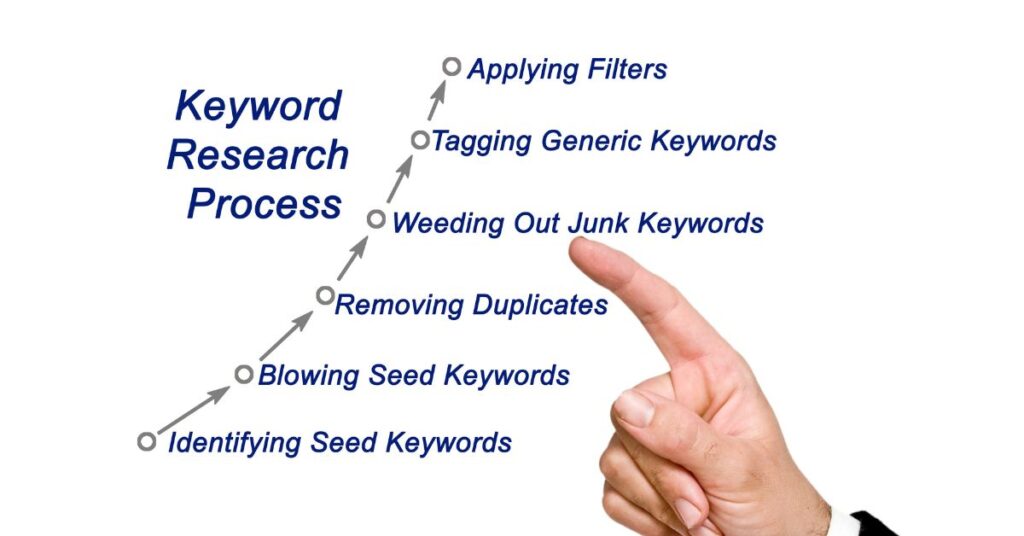
A free keyword research tool is available from Google Ads called Google Keyword Planner. It allows you to generate keyword ideas and view monthly search volumes and competition data for keywords.
How to Use Google Keyword Planner for Keyword Research
To use Google Keyword Planner for keyword research, follow these steps:
Pros of Google Keyword Planner
Cons of Google Keyword Planner
Ubersuggest
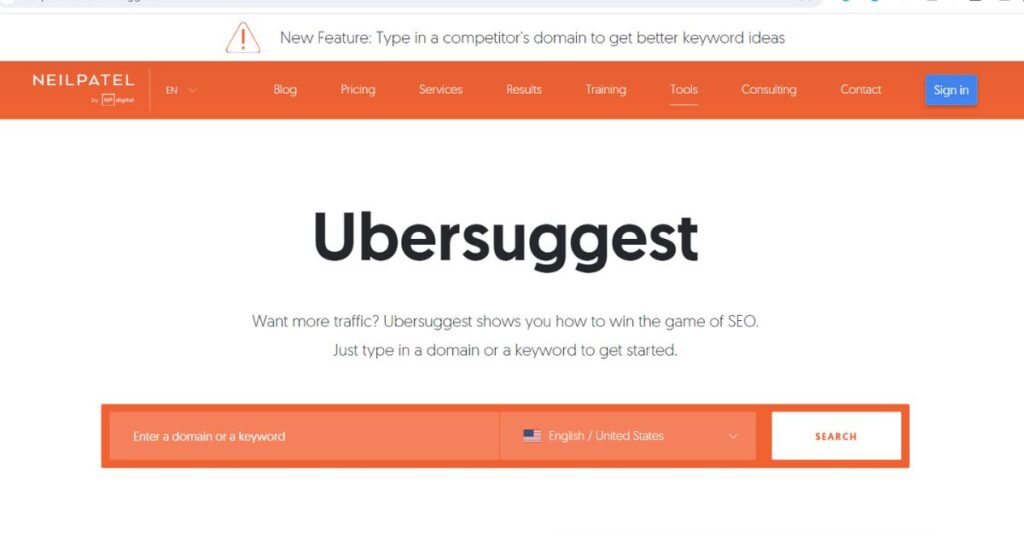
Ubersuggest is a free keyword research tool developed by Neil Patel. It allows you to generate keyword ideas by entering a root keyword or URL.
How to Use Ubersuggest for Keyword Research
To use Ubersuggest for keyword research, follow these steps:
Pros of Ubersuggest
Cons of Ubersuggest
Ubersuggest is a free, user-friendly application that facilitates the generation of keyword ideas with an intuitive UI. It offers helpful keyword statistics, such as difficulty score and search volume. However, as a stand-alone keyword research tool, it is limited by the absence of historical data and search parameters. It works best when combined with additional keyword tools.
Ahrefs
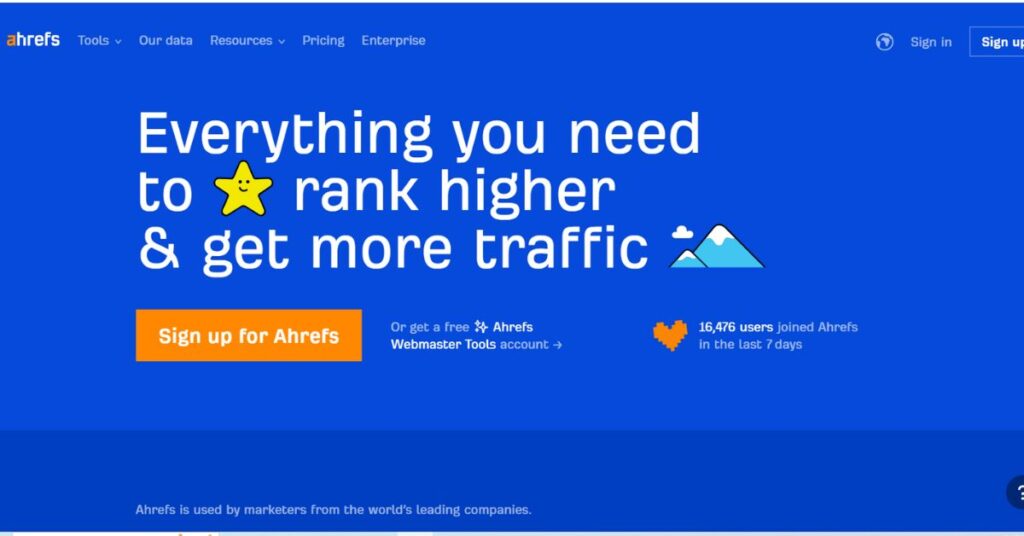
Ahrefs is one of the most powerful keyword research tools available. It provides detailed keyword data to help you find the best keywords to target.
Overview of Ahrefs
Ahrefs offers a comprehensive keyword research suite as part of its SEO toolkit. It tracks data on over 10 trillion keywords so you can dig deep into any niche or market.
Some of the key features for keyword research include:
How to Use Ahrefs for Keyword Research
Here’s a simple workflow for using Ahrefs to research keywords:
Pros and Cons of Ahrefs
Pros:
Cons:
Overall, Ahrefs is one of the best-paid tools for in-depth keyword research due to the breadth of its data and competition intelligence. Although it comes at a premium cost, agencies and SEO experts in big campaigns will find it a valuable investment.
SEMrush
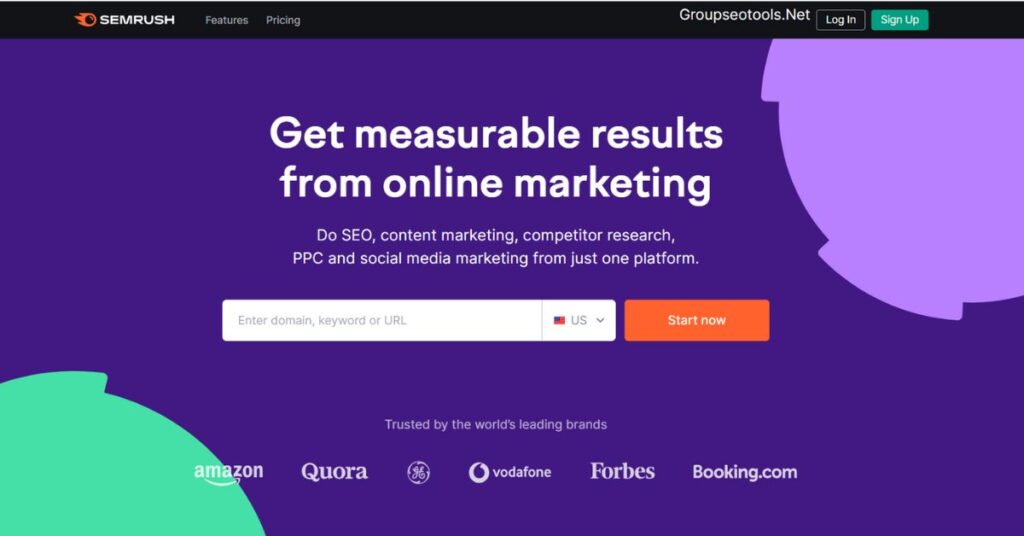
SEMrush is one of the most powerful keyword research tools available. It provides in-depth data on search volume, competition, and more to help optimize your SEO strategy.
Overview of SEMrush
SEMrush is a comprehensive digital marketing toolbox that includes keyword research, competitor analysis, backlink monitoring, rank tracking, and more. You may use the keyword research tool to find and evaluate keywords to help you decide which ones to target in your content.
With SEMrush, you can:
How to Use SEMrush for Keyword Research
Using SEMrush for keyword research is easy. Enter your seed keyword or domain, and SEMrush will provide keyword ideas and detailed data.
You may filter terms by difficulty, CPC, search volume, and other factors to locate plausible solutions. Position tracking analyses your rivals’ and your keyword rankings. This assists in identifying places where you may target keywords that you are not ranking for but that rivals are.
There are countless keyword suggestions and permutations available with the Keyword Magic Tool. You can also use the Keyword Gap function to spot missed chances to compare your keyword list with a competitor’s.
Pros and Cons of SEMrush
Pros
Cons
Overall, SEMrush is ideal for larger brands with bigger budgets. The expansive feature set provides powerful capabilities for enterprises and SEO professionals. But the cost and complexity make it overkill for smaller sites just looking for basic keyword research.
Moz Keyword Explorer
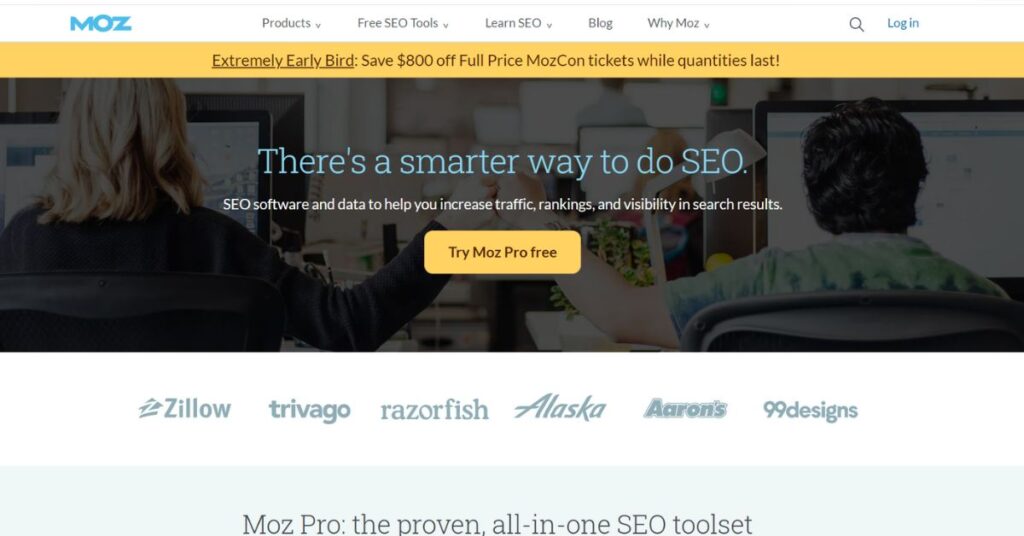
Moz Keyword Explorer is a free keyword research tool from Moz that helps find new keyword opportunities and analyze existing keywords.
Overview of Moz Keyword Explorer
Moz Keyword Explorer lets you select keywords by search volume, cost-per-click (CPC), and difficulty level, in addition to providing keyword ideas based on seed keywords. It provides keyword analytics straight from Google, such as search volume and CPC information.
To assist in finding phrases that convert better, it also displays click-through rates or CTR. Based on the Mozscape database of 10 billion web pages, the CTR statistics are obtained.
How to Use Moz Keyword Explorer for Keyword Research
To use Moz Keyword Explorer for keyword research:
The keyword list can be exported as a CSV file for use in other tools. You can also see historical CTR data for keywords to find converts well.
Pros and Cons of Moz Keyword Explorer
Pros:
Cons:
Moz Keyword Explorer provides a simple and easy way to research new keyword opportunities for SEO. It’s ideal for smaller businesses on a budget looking for basic keyword research and metrics.
Keywordtool.io
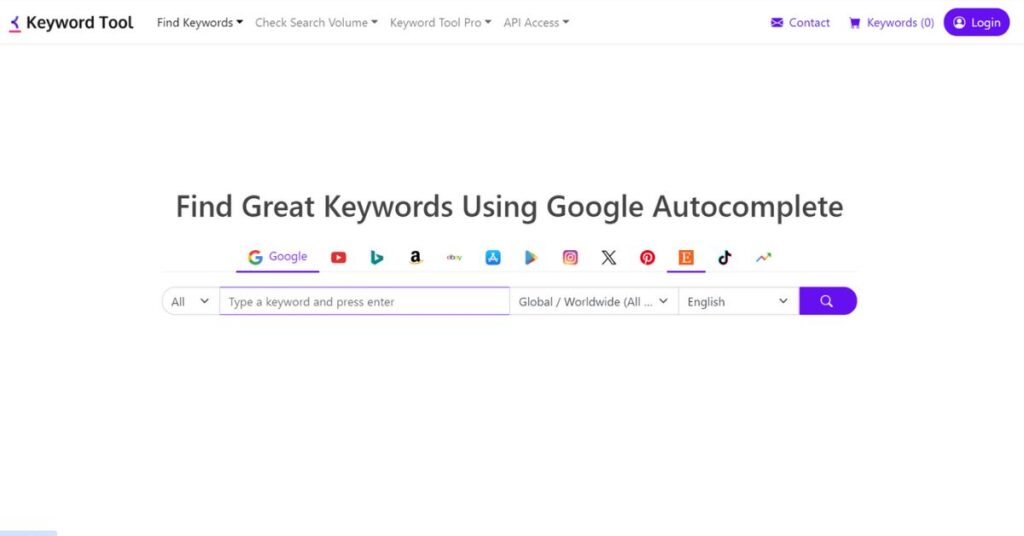
Keywordtool.io is a free keyword research tool developed by Mangools. It provides keyword search volume data and other metrics to help with SEO and PPC research.
To use Keywordtool.io for keyword research, type a seed term or phrase into the search field. The tool will list potential keywords for your phrase and Google AdWords data on monthly search volume, cost per click, and competitiveness.
Some of the key features of Keywordtool.io include:
The primary advantages of using Keywordtool.io are its enormous keyword data, ease of use, and limitless free usage. The user-friendly interface makes it simple to study and export keyword lists.
The keyword data might be inaccurate compared to premium tools, which is one drawback. Additionally, the number of keyword concepts you can develop for each search is limited. One of the greatest free keyword research tools out there is Keywordtool.io.
Keysearch
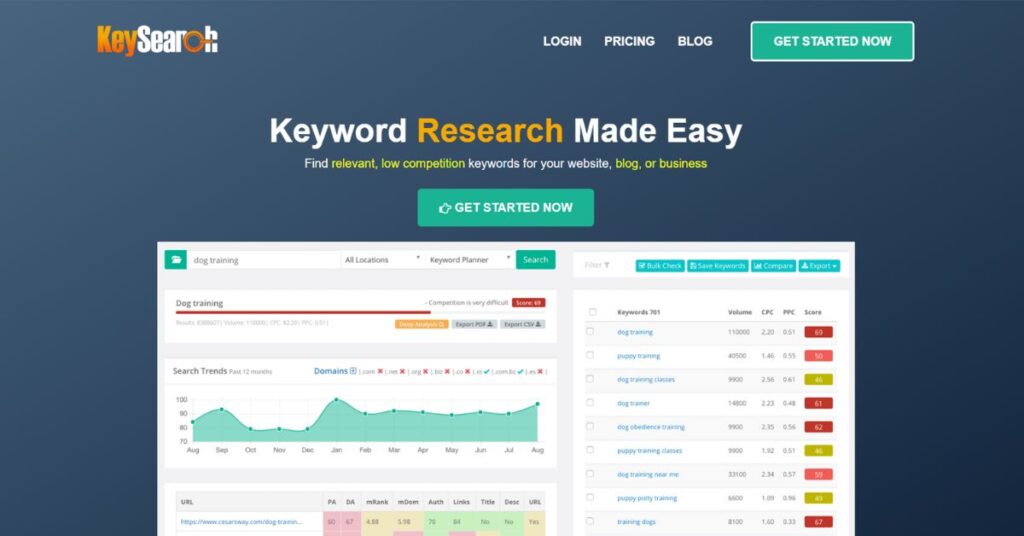
Keysearch is an AI-powered keyword research tool that aims to help SEO professionals and content marketers discover high-potential keywords faster.
Overview of Keysearch
Keysearch analyses billions of keywords using cutting-edge AI and machine learning algorithms to rapidly find keyword possibilities relevant to your company. Anthropic, an AI firm, developed it as the “smartest” keyword research tool.
Some key features of Keysearch include:
How to Use Keysearch for Keyword Research
Conducting keyword research in Keysearch is simple:
Keysearch makes finding high-potential, low-competition keywords incredibly fast compared to manual research methods.
Pros and Cons of Keysearch
Here are some key pros and cons to consider about Keysearch:
Pros
Cons
Overall, Keysearch stands out for its speed and ease of use, powered by advanced AI. It’s a great choice for anyone wanting fast, high-quality keyword suggestions with minimal manual work. The AI focus means it has fewer research filters than some tools. But it excellently complements other keyword research methods.
Conclusion
One of the most crucial elements of SEO is conducting keyword research. Your SEO and content marketing plan might succeed or fail, depending on the keywords you choose to target. We examined a few of the best keyword research tools in this post to assist you in identifying keywords that will bring targeted visitors to your website.
In conclusion, Google Keyword Planner is an excellent resource for directly obtaining Google search traffic data and keyword suggestions. To get a lengthy list of long-tail keyword variants, Ubersuggest is helpful. Ahrefs offers comprehensive metrics for difficulty and keyword data.
SEMrush provides numerous alternatives for keyword research and related keywords. Data on historical and seasonal search volume is available through Moz Keyword Explorer. Geo-targeted keywords are generated using Keywordtool.io. Moreover, Keysearch is perfect for researching local SEO keywords.
The key takeaways are:
You may improve your sites to draw in people who are searching for the answers you provide by using the appropriate keywords. Do extensive keyword research with the greatest resources at your disposal.
To choose your best high-potential keywords, compare the statistics between them. This will be the cornerstone of a successful content marketing and SEO plan.
References
An overview of the top keyword research tools for SEO can be found in this post. Every tool, nevertheless, offers more features and skills that are worth investigating. To understand more about these keyword tools, check out these suggested resources:
Although it takes time, in-depth keyword research lays the essential groundwork for a successful SEO approach. You can get the most out of the tools covered in this book by using the resources listed above. Please let me know if you require any other suggestions to increase your knowledge of keyword research!



1 comment
[…] In the changing market for online publicity, SEO scores are essential. If website owners and digital marketers use these numbers, they may have the most success online ever. You need to know about SEO scores to succeed in the huge and constantly changing online business world. This article looks at SEO scores and how well a website does. Ultimately, you’ll learn how to improve your website’s SEO. […]